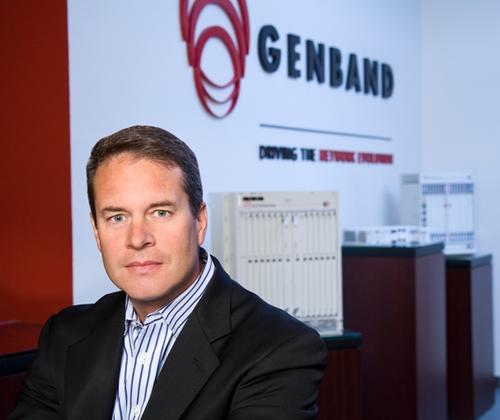Some of this is going to sound familiar... More whys and wherefores about buying a Nortel division

So, Genband Inc. is taking the plunge, with yesterday's $282 million offer for the Nortel Networks Ltd. Carrier VoIP and Application Solutions (CVAS) unit. (See Genband Bids $282M for Nortel's VoIP Unit.)
As Genband CEO Charles Vogt admits, the similarities to Ciena Corp. (NYSE: CIEN) bidding for Nortel's Metro Ethernet Networks division are there: A mid-sized company that's made a lot of acquisitions is betting its future on an acquisition. (See Gary Smith, CEO, Ci-MEN-a.)
Vogt talked with Light Reading Wednesday afternoon, as the smoke was clearing on Genband's announcement of the acquisition bid. As with previous Nortel divisions, this first bid launches an auction process that will culminate a little more than a month later.
This wasn't a last-minute decision. Genband has spent six months staring at CVAS, Vogt says. To hear him tell it, Genband is gallantly taking on what could be the most ornery of the major Nortel divisions.
As with Ciena, the prize would be a boosted standing in the telecom industry, among Tier 1 carriers in particular. And, as with Ciena, the potential downside is a fiery death spiral.
"This is a pretty sensitive time for us, so I don't think we're going to be as open as we would after a deal closes," Vogt warned. But he's been around long enough to know that's not going to stop anyone from asking. Contents:
Contents:
Page 2: Lookalikes
Page 3: It's Complicated
Page 4: The Core Four
— Craig Matsumoto, West Coast Editor, Light Reading
Next page: Lookalikes
Light Reading: I don't think we've ever met in person. Is it true you look like Rob Lowe?
Vogt: It's kinda funny. When I was a kid, everybody used to say I look like Rob Lowe. I wish I resembled him more now.
Light Reading: Anyway, congratulations on busting up a slow news week.
Vogt: The bad news is, everybody's on vacation. The good news is, the people who are working have nothing to do but write good news about Genband.
I've been getting calls from the investment bankers such as Morgan Stanley . They said "Charlie, you are awfully sly," because we've tried very hard to stay under the radar the last six months or so.
Light Reading: How does this auction compare with Nortel's metro Ethernet, wireless, and enterprise sales?
Vogt: It probably comes with the most risk. It's arguably a 100-year-old division, and it's got a lot of legacy, a lot of infrastructure, that's got to be transformed. I think the only thing that gives us comfort is that we've got a lot of Nortel intellectual property at Genband.
Light Reading: At $282 million, the bid is about one-third of what people were expecting...
Vogt: I think our bid is fair. We've done six months worth of due diligence, and what I would tell you is that I think our bid is very comparable for what we're getting. It's probably the most risky transaction, which is why I think we're the perfect candidate. I think it would be a very risky transaction for a public company. There are just a lot of moving pieces that have got to be transitioned very succinctly. Mistakes are going to be made, and away from the eye of a public market is a much better place to be.
Light Reading: You keep saying it's the most risky of the Nortel transactions. How so?
Vogt: If you look at the other assets, other than the enterprise, they're fairly compartmentalized. They're businesses that were really created over the last 15 years. CVAS is a division that has had products in the market for a long, long time.
CVAS is dealing with the ultimate opportunity and the ultimate challenge that we have in the industry: How do you effectively transition TDM networks to IP and do it in a way that allows carriers to manage their back-office systems and also be able to incorporate a variety of next-generation players that are in the network today? That's a challenge that the other divisions don't necessarily have to tackle.
Light Reading: If it's that big a risk, can we say you're betting the company, like Ciena?
Vogt: I think we are betting the company. I think for anybody our size, just looking at the numbers, you are betting the company, similar to Ciena. You are betting the company that this is the strategy that's going to take you to the next level, but it could also be a strategy that takes you down. This is a high-risk, high-return opportunity for us.
Light Reading: CVAS has around 2,200 employees. How many have you got?
Vogt: Today, we have 450 – about 250 in Dallas, and then we have a facility in Shanghai and a smattering of sales offices around the world. We also employ another 100 non-full-time employees in India.
Next page: It's Complicated
Light Reading: So, this took you six months...
Vogt: I just told you, it's a very, very complex transaction. You've got a company that went into bankruptcy, and there wasn't a buyer for the whole thing. I think they would have taken that offer, if there was a buyer for the whole thing – so they had to split it up into the most common divisional breakouts, and this particular division was a subdivision of the carrier networks group. It's really a carveout of a carveout.
There are risks in the data. There are risks in the financials. There are risks in every element of the business. But it's really all the other elements – all the back-office systems that are driving this business. It's 18 months of work to transition all of those legacy systems, literally dozens and dozens of legacy IT and financial systems that have to be converted and mapped to Genband's IT infrastructure.
Light Reading: Right, but couldn't you lower the risk by leaving behind the employees, and just buying the technology?
Vogt: You could never do that. The most important part of any acquisition – and this is not a line, since I did five acquisitions in two years – ultimately, mergers are successful or not based on the human element.
It's not a line. It's true. The human capital is critical. It's all about people, and if you don't have the right people, you have nothing. Look at Genband. We started in 1999 and started generating revenue in 2004; we were 75 percent compound annual growth up to 2009; we expect revenues to be flat year-to-year in 2009 compared with 2008. People are going to be a critical element to make sure we have a successful integration.
Light Reading: Flat in 2009? I guess that's not too bad.
Vogt: They say flat is the new up in 2009. We're not happy with it, but most of our peers in the industry are going to report sales down 10 to 15 percent. To be able to achieve nearly flat is pretty good. Light Reading: How flat is "nearly flat?" Are we talking a little tiny bit down, or a little tiny bit up?
Vogt: I would say we're going to be -- [pause] -- about flat. Flat's pretty flat. Let me say, if we were talking on Jan. 20, I'd be able to tell you, but it's still Dec. 23.
Light Reading: Yeah, but you're a private company. You can tell us anything you want, right?
Vogt: Yes, I could.
Next page: The Core Four
Light Reading: How would a CVAS acquisition affect your relationship with OEM partners?
Vogt: We think our OEM partners will be very keen to work with us even more closely than before, because it gives them a closer relationship to that Nortel customer base.
The Core Four, I call 'em, are NEC Corp. (Tokyo: 6701), Ericsson AB (Nasdaq: ERIC), Alcatel-Lucent (NYSE: ALU), and Nokia Networks , and we've got a great relationship with all four. NEC is our fixed/mobile convergence partner; we're doing femtocells with them. We do a lot with Nokia Siemens around IMS. We do a lot with Alcatel around GPON and the mobile switching space. And Ericsson is with GPON and IP switching.
Light Reading: So, wouldn't you start to intersect with some of their products?
Vogt: Nortel has a market-leading softswitch and application switch portfolio. We have a market-leading IP gateway portfolio. So, we actually think this enhances our opportunity to continue to partner. We've been very vocal that to be successful in the new world, you have to promote interoperability and promote opening the interfaces and transitioning to IP.
Making sure customers are going to accept Genband as the right suitor for the business is also something that was important to us, and we feel like the customers that matter are very supportive.
Light Reading: Now, weren't you getting out of application switches?
Vogt: [Laughs] It's good that some of the analysts were actually listening and paying attention.
We had acquired BayPackets back in 2006, which was an applications company, and then when we bought the switching division from Tekelec , what came with that was a Class 4 softswitch, a media gateway, and VocalData's application server. We did divest that, but we divested it at a time when it felt like it didn't serve our strategy and our vision. (See Genband Splashes Out for BayPackets, Genband Takes Tekelec Switch Biz, Genband Unloads BayPackets, and BroadSoft Buys Genband's M6.)
Obviously, we're not making any decisions about product rationalization prior to closing this, but one of the things that we'll have to think through is what makes sense for us. Clearly, we feel like what's driving this transaction is Nortel's softswitch and applications portfolio, which we believe complements our IP gateway portfolio, and that's at the heart of what's interesting to us. We actually have a common customer base today, which makes it possible for us to migrate a lot of the legacy technology to IP.
Light Reading: Nokia Siemens keeps losing out in these Nortel auctions. (See Ericsson Delivers Knockout Blow to NSN and NSN Hopes Dashed as Ciena/Nortel Deal OK'd.) Any trash talk for them if they try to butt into this one?
Vogt: Have they decided to bid for this?
Light Reading: Beats me.
Vogt: If they do, they do. I personally don't see the fit. If you look at Alcatel-Lucent, you look at Ericsson, if you look at Nokia Siemens – they have very comprehensive softswitch portfolios today. They have very comprehensive gateway portfolios today. It's unlike the other auctions, where you could argue NSN didn't have as strong a position in the Ethernet market, or that they were trying to strengthen their wireless position in North America. Those two made a lot of sense. I don't see the value any of those three would get, especially since they each have an alliance with Genband.
Light Reading: Maybe they're tired of Genband?
Vogt: Let me put it this way: There's a reason why we're No. 1 in IP gateways today.
I mean, anything's possible, but to take on all the other elements with a deal like this, just to put a product rationalization argument in front of the company – that, I don't get. The biggest problem all these companies have had over the last 10 years is product rationalization. To know that Genband, a partner they already have a good relationship with, is a potential suitor for this business, to me would appear to be the best of both worlds to them.
Back to Introduction
About the Author(s)
You May Also Like











